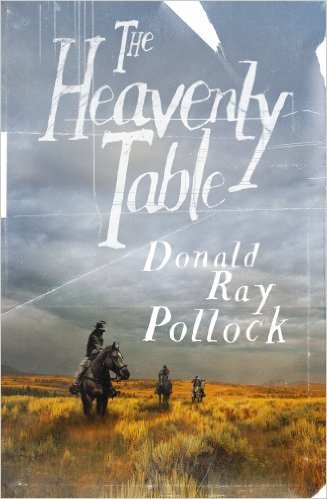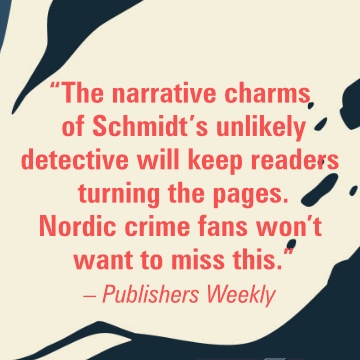 Written by Donald Ray Pollock — In the early 20th century, the three Jewett brothers are under the thumb of their crazily religious, impoverished failure of a father. He’s working them practically to death in the swampy field they’re clearing near the Georgia-Alabama border. The wealthy landowner has promised that if they meet some impossible deadline, he will give them 10 laying hens. If so, maybe they will finally have something to eat.
Written by Donald Ray Pollock — In the early 20th century, the three Jewett brothers are under the thumb of their crazily religious, impoverished failure of a father. He’s working them practically to death in the swampy field they’re clearing near the Georgia-Alabama border. The wealthy landowner has promised that if they meet some impossible deadline, he will give them 10 laying hens. If so, maybe they will finally have something to eat.
A couple of states north, in southern Ohio, live the elderly farmer Ellsworth Fiddler and his wife Eula, also struggling. The previous year, Ells gave all the savings Eula had scraped together over the decades to a flim-flam man. He stole the family’s pride and hope along with their cash. Their son Eddie has disappeared, and Ells clings to the idea he’s joined the army, which has set up a training camp nearby for the area’s uneducated, unwashed, and unprepared young men who will fight in World War I.
Pollock describes the landscape – both physical and mental – of these characters’ lives so well, you feel like you know them and care about their likely blighted futures. The Jewett boys’ father Pearl named them Chimney, Cane and Cob. Drunk and stubborn when they were born, he called them after whatever was at hand. Their mother, who died of a tapeworm, decided to pick her battles and let the names stand. Pollock does not spare you her post-mortem details.
The title of this novel reveals its theme. Early on, Pearl Jewett encounters a hobo with a long grizzled beard who follows a white bird and talks about a heavenly table where a man’s hungers will be satisfied. Only those who have suffered in life can sit there. And God gives men the chance to do so by bringing them troubles. Pearl tells his boys about the heavenly table and Cob, taking the tale literally, practically salivates every time he thinks of it. Thereafter, Pearl actively pursues misery for himself and his boys, to ensure their place there. (The old hermit reappears very briefly later in the novel, its only quasi-supernatural element.)
When Pearl dies, the three boys fall into a life of crime, stealing guns and robbing stores and banks on their way north to Canada. They soon become wanted men, with a heavy price on their heads, and are accused of way more devilment and destruction than they actually commit. They need to lie low for a while, which brings them to a brief sojourn on the farm of Ellsworth and Eula Fiddler.
They intend to change their appearance, give up their horses, and get a car. Because they are so notorious by this point, they split up, Cob staying with Cane, and take up temporary residence in the nearby town of Meade. Meade offers delights beyond their previous knowing. They have money and for once Cob has enough to eat. They have whores down at the Whore Barn, and Chimney falls in love. They have a book store so Cane, the one who can read, buys Richard III.
Many other characters weave in and out of the brothers’ lives: Jasper Cone, the Meade ‘sanitarian’ whose job is to assess the functioning of the town’s hundreds of outhouses and keep them from polluting the drinking water; Sugar, a black man whom the trio encounters and torments; Pollard, owner of the Blind Owl bar and a sadistic killer; and Lieutenant Bovard at the army camp who dreams of dying in glory in France.
Reviewers of Pollock’s previous books, Knockemstiff and The Devil All the Time, compared him to William Faulkner and Flannery O’Connor for his gothic southernness and unsettling storylines. This book is a little like Cormac McCarthy’s Suttree, deemed a comic masterpiece. Some situations in The Heavenly Table are briefly comical, though it’s mostly the darkest of Southern Noir. The unrelenting grimness of life in the countryside and small-town Meade is as far from the tidy English village of St Mary Mead as one can possibly imagine.
Living in squalor, uneducated, making bad decisions, drinking too much, and succumbing to violence, few of the characters have any hope for redemption in this life or reaching ‘the heavenly table’ in the next. To read this book, you’ll need a strong stomach and may want a hot shower afterward, but you’ll never forget Pollock’s compelling characters.
Harvill Secker
Print/Kindle/iBook
£8.99
CFL Rating: 4 Stars










I just finished this yesterday. I’m a huge fan of Pollock’s ever since the demented, white-trash circus of Knockemstiff completely rearranged my ideas about what short stories can be. So, The Heavenly Table: I enjoyed it, but I don’t think it (or The Devil All The Time) will stick in my mind the way Knockemstiff does. Pollock seems to borrow some small pieces from other books, as I can recognize bits of Larry Brown, Tom Franklin, and yes, Cormac McCarthy. At times, it almost seems cartonish. Everyone with any sort of station in life is universally portrayed as corrupt and dissipated. Meanwhile, what is it with Writers with a capital W always wanting to have some dirt-poor barely–literate character have a secret love of literature? You got Cane Jewett going from reading the covers off some cheap dime novel, all his life, and then he’s struggling through Shakespeare. Pollock tries to make it fit by having Cane pick it almost at random and not understand half of it, but it just doesn’t. There are also a few instances where I felt like the language didn’t quite fit 1917. At one point a character muses about wasting his life on “skanks and booze.” Skanks? Did they use that word back then? Something like “tramps” would seem more contemporary. Last and most probably least, the word is “accidentally,” not “accidently.” Having said all that, I’m still a DRP fanboy.